
ANCHORAGE – The Ninth Circuit Court of Appeals has upheld James Wells’ murder convictions which were handed down by a trial jury in October 2019 for the April 2012 murders of two U.S. Coast Guard (USCG) employees, Electrician’s Mate First Class James Hopkins and retired Chief Boatswain’s Mate Richard Belisle at a United States Coast Guard base on Kodiak Island, Alaska.
In February 2013, Wells was arrested for the murders of Hopkins and Belisle, who were both Wells’ co-workers at the USCG antenna maintenance facility, located at the USCG Communication Station (COMMSTA) on Kodiak Island. Wells was convicted in 2014 and the case was reversed for retrial by the Ninth Circuit Court of Appeals in December 2017. After a three-week retrial that ended in October 2019, a federal jury quickly convicted Wells of two counts of first-degree murder, two counts of murder of an officer or employee of the United States and two counts of possession and use of a firearm in relation to a crime of violence. Wells appealed. In a ruling issued last week, the Ninth Circuit Court of Appeals upheld Wells’ murder convictions, thus Wells sentence of life imprisonment remains in place. The court of appeals issued two separate rulings: 1) affirming the convictions and dismissing Wells’ arguments for a new trial and 2) the court remanded the sentencing court’s decision on valuing how restitution to the spouses of the men Wells murdered would be paid, along with upholding that Wells interview by investigators was done lawfully.
“The court’s ruling, solidly affirming Wells two murder convictions at trial, puts an end to this saga for the wives of Messrs. Belisle and Hopkins, the colleagues of the murdered men, the community of Kodiak and the United States Coast Guard,” said U.S. Attorney S. Lane Tucker. “Justice has been served. James Wells took the stand and attempted to explain away what he did that day, an explanation that was quickly rejected by the trial jury and by the court of appeals. Wells will spend the rest of his life in prison for the murder of these two men.”
“We are all relieved to bring final closure on this heinous and heartless crime. Our hearts continue to go out to the families and loved ones of the victims, and to the community of Kodiak for having the strength to endure this lengthy process,” said Paul Shultz, CGIS Special Agent in Charge, CGIS Northwest Region.
“I’m proud of the trial team’s tireless efforts in the pursuit of justice on behalf of the Hopkins and Belisle families. Now with the Appellate Court’s decision, comes a sense of some closure for all,” said Special Agent in Charge Antony Jung of the FBI Anchorage Field Office.
Evidence at trial established that on April 12, 2012, between 7:09 a.m. and 7:14 a.m., Wells had shot and killed Hopkins and Belisle with a .44 revolver while working at their duty stations in the Rigger Shop at COMMSTA. First responders noted no evidence of a break-in or robbery and both men appeared to be victims of a targeted killing. Wells was due to arrive at the Rigger Shop the same time as Hopkins and Belisle, but instead left two phone messages for Hopkins and Belisle, noted to be after the victims’ time of death, stating Wells was running late due to a flat tire. Wells arrived to the Rigger Shop over an hour after his normal start time, immediately claiming to have had a flat tire.
USCG security videos captured Wells passing the Main Gate at Base Kodiak at 6:48 a.m. in his white Dodge truck on his way toward the Kodiak Airport, and returning toward his residence at 7:22 a.m. However, a small blue SUV, owned by Wells, was captured on USCG security videos passing the Rigger Shop front entrance. The evidence showed Wells drove his white Dodge truck to the airport, where he swapped vehicles and drove Nancy Wells’ blue Honda CR-V to COMMSTA to commit the murders. There was a 34-minute period of time for which James Wells could not account and that unexplained discrepancy captured the attention of the interviewing agents. Additionally, a tire with a nail in it was seized and through extensive testing, the examiner concluded that the nail had been manually inserted into the tire, undermining the foundation of Wells’ alibi that he had picked up a nail while driving to work on the morning of the murders.
At Wells’ sentencing hearing after the second trial in 2019, U.S. District Judge Sharon L. Gleason made specific findings for the record that Wells threatened or unlawfully interfered with witnesses and that during the trial, Wells testified on several occasions in a “materially false manner.” The ruling of the Ninth Circuit equally found that Wells’ alibi at trial was not credible.
“I want to thank all of our partner agencies that were involved in the prosecution of this case through the decade of sentencing, retrial, and appeals,” said Rear Adm. Nathan Moore, 17th Coast Guard District, Commander. “Your continued dedication to this case ensured justice was met, and that James’ and Richard’s loved ones and our Coast Guard family can move one step closer to closure.”
The Federal Bureau of Investigation (FBI) conducted the investigation leading to the successful prosecution of this case, with support from the U.S. Coast Guard Investigative Service (CGIS), and the Alaska State Troopers (AST).
In 2019 the Deputy Criminal Chief Steven Skrocki prosecuted the case along with Assistant U.S. Attorney Christina Sherman, and U.S. Coast Guard Commander Kelly Stevens, who was appointed as a Special Assistant U.S. Attorney.
###
